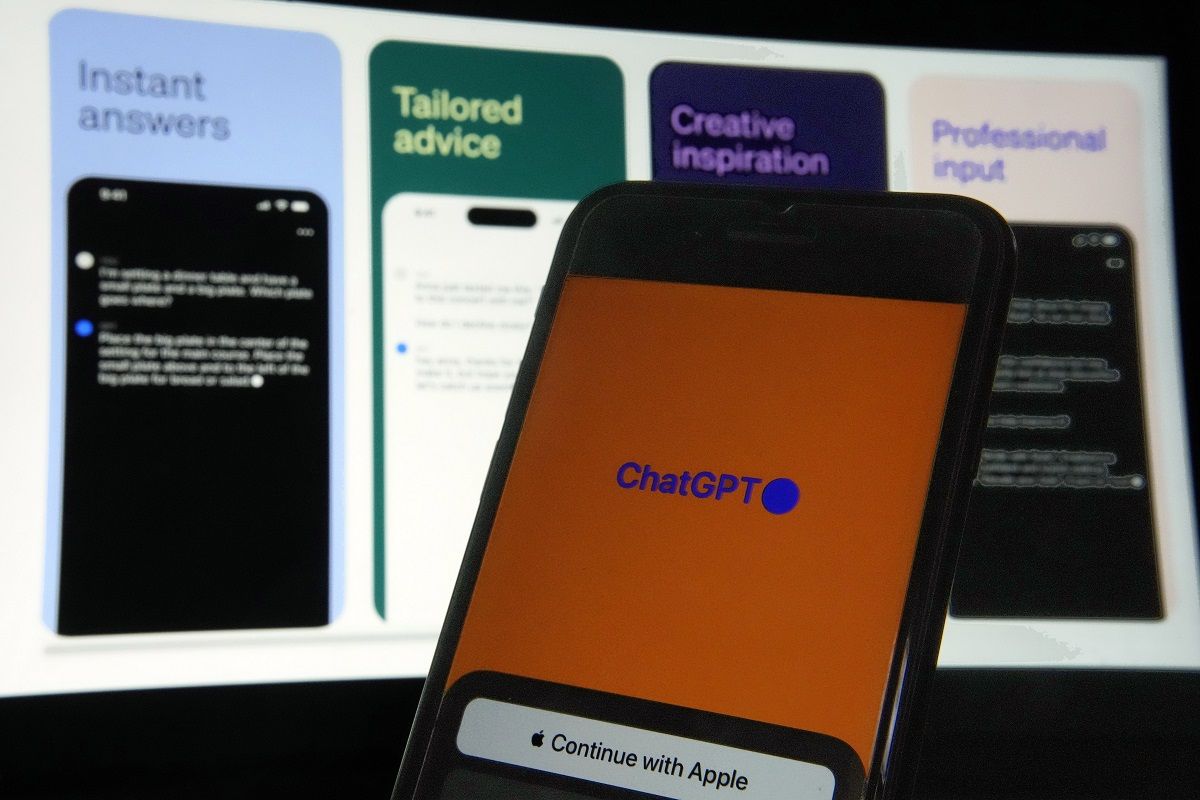
The ChatGPT app is seen on an iPhone in New York, Thursday, May 18, 2023.
15:36 JST, June 14, 2023
LONDON (AP) — Authorities worldwide are racing to rein in artificial intelligence, including in the European Union, where groundbreaking legislation is set to pass a key hurdle Wednesday.
European Parliament lawmakers are due to vote on the proposal — including controversial amendments on facial recognition — as it heads toward passage.
A yearslong effort by Brussels to draw up guardrails for AI has taken on more urgency as rapid advances in chatbots like ChatGPT show the benefits the emerging technology can bring — and the new perils it poses.
Here’s a look at the EU’s Artificial Intelligence Act:
HOW DO THE RULES WORK?
The measure, first proposed in 2021, will govern any product or service that uses an artificial intelligence system. The act will classify AI systems according to four levels of risk, from minimal to unacceptable.
Riskier applications, such as for hiring or tech targeted to children, will face tougher requirements, including being more transparent and using accurate data.
Violations will draw fines of up to 30 million euros ($33 million) or 6% of a company’s annual global revenue, which in the case of tech companies like Google and Microsoft could amount to billions.
It will be up to the EU’s 27 member states to enforce the rules.
WHAT ARE THE RISKS?
WHAT ARE THE RISKS?One of the EU’s main goals is to guard against any AI threats to health and safety and protect fundamental rights and values.
That means some AI uses are an absolute no-no, such as “social scoring” systems that judge people based on their behavior.
Also forbidden is AI that exploits vulnerable people, including children, or uses subliminal manipulation that can result in harm, for example, an interactive talking toy that encourages dangerous behavior.
Predictive policing tools, which crunch data to forecast who will commit crimes, is also out.
Lawmakers beefed up the original proposal from the European Commission, the EU’s executive branch, by widening the ban on remote facial recognition and biometric identification in public. The technology scans passers-by and uses AI to match their faces or other physical traits to a database.
But it faces a last-minute challenge after a center-right party added an amendment allowing law enforcement exceptions such as finding missing children, identifying suspects involved in serious crimes or preventing terrorist threats.
“We don’t want mass surveillance, we don’t want social scoring, we don’t want predictive policing in the European Union, full stop. That’s what China does, not us,” Dragos Tudorache, a Romanian member of the European Parliament who is co-leading its work on the AI Act, said Tuesday.
AI systems used in categories like employment and education, which would affect the course of a person’s life, face tough requirements such as being transparent with users and taking steps to assess and reduce risks of bias from algorithms.
Most AI systems, such as video games or spam filters, fall into the low- or no-risk category, the commission says.
WHAT ABOUT CHATGPT?
The original measure barely mentioned chatbots, mainly by requiring them to be labeled so users know they’re interacting with a machine. Negotiators later added provisions to cover general purpose AI like ChatGPT after it exploded in popularity, subjecting that technology to some of the same requirements as high-risk systems.
One key addition is a requirement to thoroughly document any copyright material used to teach AI systems how to generate text, images, video and music that resemble human work.
That would let content creators know if their blog posts, digital books, scientific articles or songs have been used to train algorithms that power systems like ChatGPT. Then they could decide whether their work has been copied and seek redress.
WHY ARE THE EU RULES SO IMPORTANT?
The European Union isn’t a big player in cutting-edge AI development. That role is taken by the U.S. and China. But Brussels often plays a trend-setting role with regulations that tend to become de facto global standards.
The sheer size of the EU’s single market, with 450 million consumers, makes it easier for companies to comply than develop different products for different regions, experts say.
But it’s not just a crackdown. By laying down common rules for AI, Brussels is also trying to develop the market by instilling confidence among users.
“The fact this is regulation that can be enforced and companies will be held liable is significant” because other places like the United States, Singapore and Britain have merely offered “guidance and recommendations,” said Kris Shashak, a technologist and senior fellow at the Irish Council for Civil Liberties.
“Other countries might want to adapt and copy” the EU rules, he said.
Others are playing catch up. Britain, which left the EU in 2020, is jockeying for a position in AI leadership. Prime Minister Rishi Sunak plans to host a world summit on AI safety this fall.
“I want to make the U.K. not just the intellectual home but the geographical home of global AI safety regulation,” Sunak said at a tech conference this week.
Britain’s summit will bring together people from “academia, business and governments from around the world” to work on “a multilateral framework,” he said.
WHAT’S NEXT?
It could be years before the rules fully take effect. The vote will be followed by three-way negotiations involving member countries, the Parliament and the European Commission, possibly facing more changes as they try to agree on the wording.
Final approval is expected by the end of this year, followed by a grace period for companies and organizations to adapt, often around two years.
To fill the gap before the legislation takes effect, Europe and the U.S. are drawing up a voluntary code of conduct that officials promised at the end of May would be drafted within weeks and could be expanded to other “like-minded countries.”
Top Articles in News Services
-

Survey Shows False Election Info Perceived as True
-

Hong Kong Ex-Publisher Jimmy Lai’s Sentence Raises International Outcry as China Defends It
-

Japan’s Nikkei Stock Average Falls as US-Iran Tensions Unsettle Investors (UPDATE 1)
-

Japan’s Nikkei Stock Average Touches 58,000 as Yen, Jgbs Rally on Election Fallout (UPDATE 1)
-

Japan’s Nikkei Stock Average Rises on Tech Rally and Takaichi’s Spending Hopes (UPDATE 1)
JN ACCESS RANKING
-

Producer Behind Pop Group XG Arrested for Cocaine Possession
-

Japan PM Takaichi’s Cabinet Resigns en Masse
-

Man Infected with Measles Reportedly Dined at Restaurant in Tokyo Station
-

Israeli Ambassador to Japan Speaks about Japan’s Role in the Reconstruction of Gaza
-

Videos Plagiarized, Reposted with False Subtitles Claiming ‘Ryukyu Belongs to China’; Anti-China False Information Also Posted in Japan
























